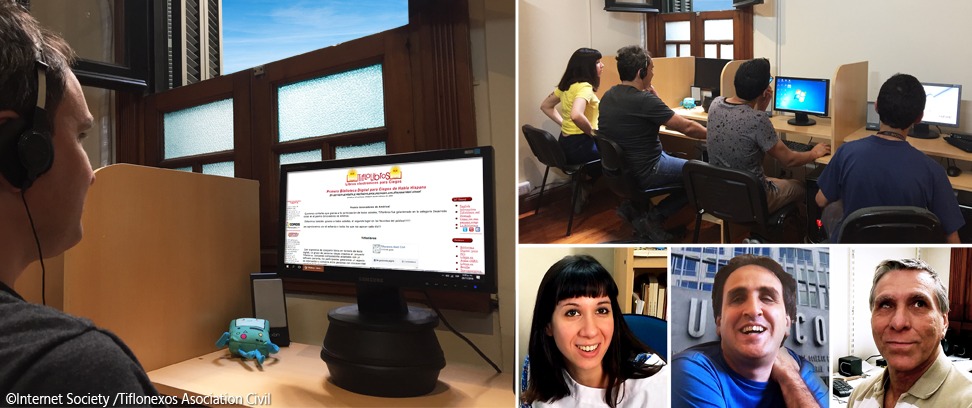Last November in Buenos Aires during the first LAC Regional Internet and Development Dialogue, we had the opportunity to listen to Pablo Lecuona talking about his organisation Tiflonexos.
Tiflonexos is a non-profit that works for the integration of visually impaired people through the creation of an online collaborative free-access library called Tiflolibros. We got to know the organisation in 2014 when they applied for a Community grant through Internet Society. So Nancy Quiros and myself decided to visit their converted apartment in Avenida Corrientes.
Tiflolibros was created in 1999 by a group of blind friends who wanted to use the power of the Internet to exchange their digital books and widen their access to culture and education. Today it is run by a team of 15 and the library has grown to 52.200 digital books in Spanish available for more than 8.000 members with severe disabilities all over the world.
The Organization contributed to a favourable reform of Argentina’s copyright law in 2007, which was followed by other Latin American countries. On December 2016, they received the UNESCO Prize for Digital Empowerment of Persons with Disabilities.
Pablo Lecuona, founder and director, summarizes his vision of the future in the following points:
- Increase the use of the library for educational purposes by converting the school books into digital version and training the teachers
- Reach underserved areas of Latin America where there is less Internet access. And maybe spread to other languages as well
- Be financially sustainable. At the moment Tiflolibros is depending on donations and grants to get to the end of the month

Braille menu printing for local restaurants is an extra source of revenue for the organisation.
So how can we all make a difference? In my view it all starts with being more aware of the issues and the challenges. 285 million people are estimated to be visually impaired globally. That is more than the whole of Brazil! For example, the Marrakech VIP Treaty made a big difference for the visually impaired in relation to copyright. The Treaty basically requires “Contracting Parties to introduce a standard set of limitations and exceptions to copyright rules in order to permit reproduction, distribution and making available of published works in formats designed to be accessible to visually impaired people, and to permit exchange of these works across borders by organizations that serve those beneficiaries.
When asking Pablo what he would like to change, he said: “80 parties or countries have signed the Treaty but currently only 25 countries or parties have ratified or accessed the Treaty. To facilitate the exchange of knowledge and to enable the creation of equal opportunities we need more countries to sign on.”
For sighted people, it is sometimes difficult to understand the challenges you face as a visually impaired. Personally I was faced with this issue last year when my husband suffered a temporary but severe diplopia (double sight). This lasted for about two months and it was enough to realise that good sight is taken for granted.
Thanks to the Internet a lot of things have been made easier for visually impaired. They can listen to incoming messages and dictate the reply to their phone. They can feel much more independent reading books and working on a computer, but they constantly need to learn new skills.
Tiflolibros offers also technical support and a discussion group where users can join to share their experience and ideas. We express our appreciation to the project team for their outstanding efforts in giving a better chance to education and social inclusion to impaired people.
It’s not only about the access to the Internet and the library, it is what people can really do and how they can change their lives. It’s all about creating equal opportunities!
The story in their own voices
Share this story
If you like this story please share it with your friends. That would tremendously help in spreading the word and raising the visibility of this project. Help more people understand how the Internet can change lives.
We are interested in your project.
We are looking for new ideas from people all over the world on how to make your community better using the Internet. Internet Society “Beyond the Net Funding Programme” funds projects up to $30,000 USD.

